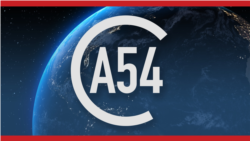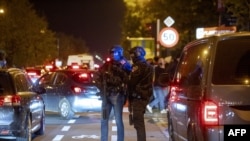A Tunisian gunman suspected of killing two Swedish football fans in Brussels died on Tuesday after being shot by police in a cafe, hours after an attack which Sweden's prime minister said showed Europe must bolster security to protect itself.
The 45-year-old, who identified himself as a member of Islamic State and claimed responsibility in a video posted online, is also suspected of wounding another Swedish national in his attack in central Brussels on Monday evening.
Chief prosecutor Frederic Van Leeuw said early indications pointed toward the gunman operating alone, rather than being part of a broad network, although two people were brought in for questioning.
Police found an ArmaLite AR-15 semi-automatic rifle and a bag of clothing in the cafe where he was discovered on Tuesday morning. Two handguns and a knife were found very close to his apartment, Van Leeuw said.
Video footage of the attack showed a man in an orange jacket on a scooter at a street intersection with a rifle following people fleeing into a building and firing at them.
According to a media transcript of the video message recorded by the self-declared perpetrator, the attacker said he had killed Swedes to avenge Muslims.
The victims were a man aged around 70 from the Stockholm region, and a man aged about 60 who lived abroad, Sweden's foreign ministry said, adding that the injured man, also around 70, was still in hospital.
'VULNERABLE'
The Brussels attack came just days after a teacher was fatally stabbed in northern France in an attack which President Emmanuel Macron condemned as "barbaric Islamic terrorism"
Monday's shooting came at a time of heightened security
concerns across Europe linked to the Israel-Hamas war.
It also coincided with alarm sounded by countries including
Italy and Germany over increasing unauthorised arrivals of
migrants as the 27-nation EU seeks to agree tighter migration and asylum rules ahead of a bloc-wide election next June.
concerns across Europe linked to the Israel-Hamas war.
It also coincided with alarm sounded by countries including
Italy and Germany over increasing unauthorised arrivals of
migrants as the 27-nation EU seeks to agree tighter migration and asylum rules ahead of a bloc-wide election next June.
The man, suspected of killing two Swedish football fans
before being shot dead by police, first applied for asylum in
Belgium in 2019, according to its Immigration Office. He lost
his case in October 2020 and, the following March, was issued an order to leave Belgium.
before being shot dead by police, first applied for asylum in
Belgium in 2019, according to its Immigration Office. He lost
his case in October 2020 and, the following March, was issued an order to leave Belgium.
But the authorities had no valid address to deliver the
decision, which bounced back from an old address, with no
correct address to be found.
"He had in fact been ordered to leave the territory. He was
not in an asylum center, he was in Brussels, he no longer had a home, and therefore the services were not able to follow him. And this is one of the big questions to which I want answers," said Belgian Prime Minister Alexander de Croo.
Obstacles to repatriating migrants deemed to have no right
to stay in the EU will be on the table when the bloc's 27
justice and home affairs ministers meet in Brussels - scene of the shooting and also home to EU institutions - on Thursday and Friday.
There were some 86,000 returns in 2022, according to EU
border agency Frontex, unchanged from the previous year despite much discussions about the need to step them up.
Of the 105,865 non-EU citizens that had been ordered to
leave the bloc, statistics agency Eurostat said earlier this
month that some 26,600 people were sent away in the second quarter of 2023, a nearly one-third increase on the year. But problems with what the EU says is poor cooperation from origin countries hinder progress.
"It has become painfully clear that our security services
clash with the unwillingness of certain North African countries to take back their illegals. The price we pay for that... is too high," said Belgian Justice Minister Vincent Van Quickenborne.
Specifically for Tunisia, a recent EU deal offering money
and assistance in exchange for Tunis keeping a tighter lid on
departures for Europe has been off to a bumpy start, something EU leaders are to discuss at a summit in Brussels on Oct. 26-27.
ITALY, SWEDEN, BELGIUM
How and why Monday's gunman continued living in Belgium
illegally is one question. Another is when and how he arrived
and from where, something Belgium's Immigration Office on
Tuesday said it had no information about.
An Italian government source told Reuters the man had
arrived on the Italian island of Lampedusa, near Tunisia, in
2011 and spent some time in Sweden too.
With at least three EU countries involved, the case points
up the challenges the EU faces tracking people across the bloc's Schengen open-travel zone that is mostly free of border checks.
Proponents of the EU's new migration pact - which has been tentatively agreed by most EU countries and is now being further negotiated with the European Parliament - say it would support returns by shortening time for migration and asylum procedures.
Critics doubt it can be effective, and point to human rights
risks. The nationalist governments in Poland and Hungary refuse to support it, or to accept any migrants from the Middle East and Africa.
"Those who are not allowed to stay in the EU must leave
Europe. That must be enforced," said Manfred Weber, the head of the center-right European People's Party group in the European Parliament. "This is a wake-up call for those who are not ready to accept ... the migration pact."





Forum